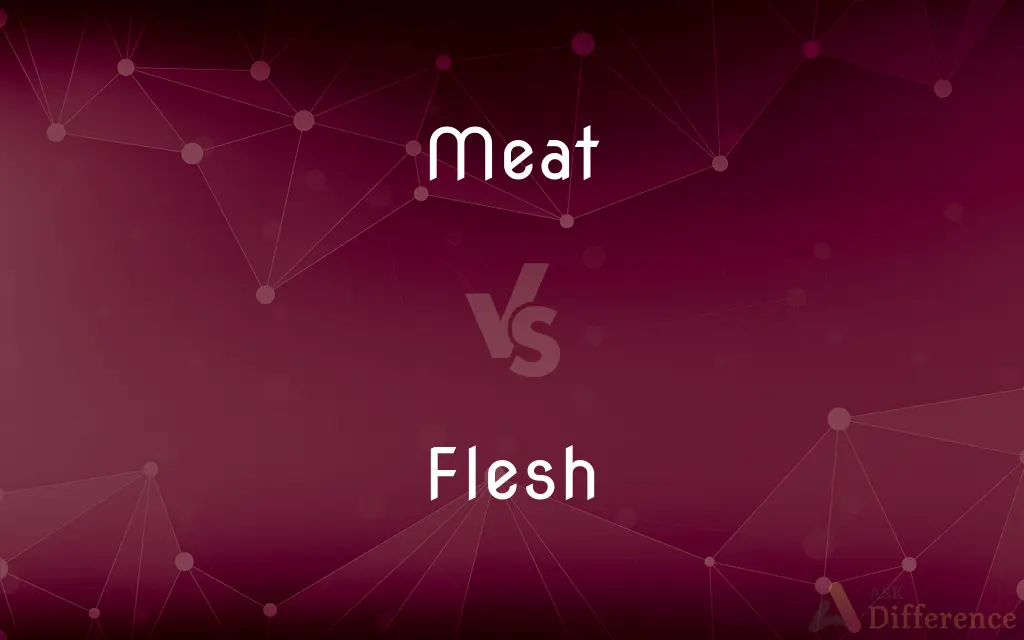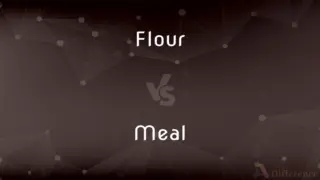Meat vs. Flesh — What's the Difference?
Edited by Tayyaba Rehman — By Fiza Rafique — Updated on October 30, 2023
Meat typically refers to the edible parts of animals, while Flesh broadly refers to the soft tissue of organisms, including humans.

Difference Between Meat and Flesh
Table of Contents
ADVERTISEMENT
Key Differences
Meat and Flesh, though sometimes used interchangeably, have distinct differences in meaning and context. Meat predominantly refers to the edible parts of animals that humans consume for sustenance. When one thinks of beef, chicken, or pork, they're referring to the meat of cattle, poultry, or pigs respectively. Flesh, on the other hand, denotes the soft tissue of organisms, encompassing muscles, fats, and sometimes skin. Thus, every human and animal has flesh, but not all flesh is considered meat in a dietary context.
The word meat is commonly used in culinary contexts. When chefs prepare dishes or when individuals go shopping, they look for different cuts of meat. For example, steak is a particular cut of meat from cattle. Flesh, conversely, holds a more general and sometimes anatomical connotation. A scientist studying the muscular structure of an animal is examining its flesh, not its meat.
Culturally and historically, meat has been a staple in many diets across civilizations. Meat consumption, its preparation, and its significance in meals vary across cultures. Flesh, however, extends beyond culinary traditions. In literature or religious texts, flesh might be used metaphorically, indicating mortality or human nature. For example, phrases like "flesh and blood" emphasize human kinship and vulnerability.
One interesting overlap between meat and flesh arises when discussing fruits and vegetables. Here, the soft, edible part of certain fruits and vegetables might be termed their "flesh." For example, the juicy part of a peach that surrounds the pit is often called the flesh of the fruit, even though it's also its "meat."
Comparison Chart
Primary Reference
Edible parts of animals.
Soft tissue of organisms, including muscles, fats, and sometimes skin.
ADVERTISEMENT
Common Context
Culinary and dietary.
Anatomical, literary, or religious.
Relation to Humans
Typically not used to describe humans.
Commonly used to describe human tissue.
Edibility
Specifically refers to parts meant for consumption.
Not all flesh is considered meat or edible.
Use in Plant Context
Rarely used, but can refer to the main edible portion of nuts.
Refers to the edible part of fruits or vegetables, like the flesh of an apple.
Compare with Definitions
Meat
The most important or essential part of something.
The meat of his argument was found in the third chapter.
Flesh
The soft substance of a human or animal body, consisting of muscle and fat.
The arrow pierced his flesh.
Meat
Substance or material providing a particular quality.
The actor was the real meat of the film's success.
Flesh
The surface or skin of the human body.
The cold wind bit at their flesh.
Meat
The edible part, as of a piece of fruit or a nut.
Flesh
Flesh is a term for some soft tissues of an organism. Various multicellular organisms have soft tissues that may be called "flesh".
Meat
The edible parts of animals, especially when prepared for cooking or consumption.
The meat of the chicken was tender and flavorful.
Flesh
The soft tissue of the body of a vertebrate, covering the bones and consisting mainly of skeletal muscle and fat
Thought the boy needed some more flesh on his bones.
Meat
Meat is animal flesh that is eaten as food. Humans have hunted and killed animals for meat since prehistoric times.
Flesh
Such tissue of an animal, used as food
Flesh of a cow.
Fish with white flesh.
Meat
The edible flesh of animals, especially that of mammals as opposed to that of fish or poultry.
Flesh
The surface or skin of the human body
Goosebumps on my flesh.
Meat
The essence, substance, or gist
The meat of the editorial.
Flesh
Fatty tissue
"a woman of wide and abundant flesh" (A.S. Byatt).
Meat
(Slang) Something that one enjoys or excels in; a forte
Tennis is his meat.
Flesh
(Botany) The pulpy, usually edible part of a fruit or vegetable.
Meat
Nourishment; food
"Love is not all.
Flesh
The human body
"the thousand natural shocks / That flesh is heir to" (Shakespeare).
Meat
The human body regarded as an object of sexual desire.
Flesh
Sensual appetites
Gratification of the flesh.
Meat
The genitals.
Flesh
Substance; reality
"The maritime strategy has an all but unstoppable institutional momentum behind it ... that has given force and flesh to the theory" (Jack Beatty).
Meat
(uncountable) The flesh (muscle tissue) of an animal used as food.
A large portion of domestic meat production comes from animals raised on factory farms.
The homesteading teenager shot a deer to supply his family with wild meat for the winter.
Flesh
To give substance or detail to; fill out. Often used with out
Fleshed out the novel with a subplot.
Meat
(countable) A type of meat, by anatomic position and provenance.
The butchery's profit rate on various meats varies greatly.
Flesh
To clean (a hide) of adhering flesh.
Meat
Food, for animals or humans, especially solid food. See also meat and drink.
Flesh
To encourage (a falcon, for example) to participate in the chase by feeding it flesh from a kill.
Meat
A type of food, a dish.
Flesh
To plunge or thrust (a weapon) into flesh.
Meat
(archaic) A meal.
Flesh
(Archaic) To inure (troops, for instance) to battle or bloodshed.
Meat
(obsolete) Meal; flour.
Flesh
To become plump or fleshy; gain weight.
Meat
(uncountable) Any relatively thick, solid part of a fruit, nut etc.
The apple looked fine on the outside, but the meat was not very firm.
Flesh
The soft tissue of the body, especially muscle and fat.
Meat
(slang) A penis.
Flesh
The skin of a human or animal.
Meat
(colloquial) The best or most substantial part of something.
We recruited him right from the meat of our competitor.
Flesh
(by extension) Bare arms, bare legs, bare torso.
Meat
(sports) The sweet spot of a bat or club (in cricket, golf, baseball etc.).
He hit it right on the meat of the bat.
Flesh
Animal tissue regarded as food; meat (but sometimes excluding fish).
Meat
(slang) A meathead.
Throw it in here, meat.
Flesh
The human body as a physical entity.
Meat
(Australian Aboriginal) A totem, or (by metonymy) a clan or clansman which uses it.
Flesh
(religion) The mortal body of a human being, contrasted with the spirit or soul.
Meat
Food, in general; anything eaten for nourishment, either by man or beast. Hence, the edible part of anything; as, the meat of a lobster, a nut, or an egg.
And God said, Behold, I have given you every herb bearing seed, . . . to you it shall be for meat.
Every moving thing that liveth shall be meat for you.
Flesh
(religion) The evil and corrupting principle working in man.
Meat
The flesh of animals used as food; esp., animal muscle; as, a breakfast of bread and fruit without meat.
Flesh
The soft, often edible, parts of fruits or vegetables.
Meat
Dinner; the chief meal.
Flesh
(obsolete) Tenderness of feeling; gentleness.
Meat
To supply with food.
His shield well lined, his horses meated well.
Flesh
(obsolete) Kindred; stock; race.
Meat
The flesh of animals (including fishes and birds and snails) used as food
Flesh
A yellowish pink colour; the colour of some Caucasian human skin.
Meat
The inner and usually edible part of a seed or grain or nut or fruit stone;
Black walnut kernels are difficult to get out of the shell
Flesh
(transitive) To reward (a hound, bird of prey etc.) with flesh of the animal killed, to excite it for further hunting; to train (an animal) to have an appetite for flesh.
Meat
The choicest or most essential or most vital part of some idea or experience;
The gist of the prosecutor's argument
The heart and soul of the Republican Party
The nub of the story
Flesh
(transitive) To bury (something, especially a weapon) in flesh.
Meat
The solid part of something.
The meat of the walnut is enclosed by a hard shell.
Flesh
(obsolete) To inure or habituate someone in or to a given practice.
Meat
The main content or substance.
She went straight to the meat of the story, avoiding any fluff.
Flesh
(transitive) To glut.
Flesh
(transitive) To put flesh on; to fatten.
Flesh
To remove the flesh from the skin during the making of leather.
Flesh
The aggregate of the muscles, fat, and other tissues which cover the framework of bones in man and other animals; especially, the muscles.
Flesh
Animal food, in distinction from vegetable; meat; especially, the body of beasts and birds used as food, as distinguished from fish.
With roasted flesh, or milk, and wastel bread.
Flesh
The human body, as distinguished from the soul; the corporeal person.
As if this flesh, which walls about our life,Were brass impregnable.
Flesh
The human eace; mankind; humanity.
All flesh had corrupted his way upon the earth.
Flesh
Human nature
There is no flesh in man's obdurate heart.
Flesh
In a bad sense, tendency to transient or physical pleasure; desire for sensual gratification; carnality.
Flesh
Kindred; stock; race.
He is our brother and our flesh.
Flesh
The soft, pulpy substance of fruit; also, that part of a root, fruit, and the like, which is fit to be eaten.
Flesh
To feed with flesh, as an incitement to further exertion; to initiate; - from the practice of training hawks and dogs by feeding them with the first game they take, or other flesh. Hence, to use upon flesh (as a murderous weapon) so as to draw blood, especially for the first time.
Full bravely hast thou fleshedThy maiden sword.
The wild dogShall flesh his tooth on every innocent.
Flesh
To glut; to satiate; hence, to harden, to accustom.
Old soldiersFleshed in the spoils of Germany and France.
Flesh
To remove flesh, membrance, etc., from, as from hides.
Flesh
The soft tissue of the body of a vertebrate: mainly muscle tissue and fat
Flesh
Alternative names for the body of a human being;
Leonardo studied the human body
He has a strong physique
The spirit is willing but the flesh is weak
Flesh
A soft moist part of a fruit
Flesh
The edible pulpy part of fruits or vegetables.
The flesh of the avocado was creamy and rich.
Flesh
Increase the size of something.
The writer needed to flesh out the characters a bit more.
Flesh
Human nature or physical form, as opposed to the spirit or soul.
They are flesh and blood, just like us.
Common Curiosities
Is all flesh considered meat?
No, while all meat is flesh, not all flesh is considered meat, especially in a dietary context.
Is meat exclusive to animals?
Primarily, yes, but the term can sometimes refer to the main edible portion of things like nuts.
Can the term "flesh" be used for fruits?
Yes, the edible part of many fruits is referred to as its flesh.
Can flesh be used in a metaphorical sense?
Yes, phrases like "flesh and blood" can indicate human kinship and vulnerability.
Is flesh a term used to discuss anatomy?
Yes, flesh can refer to the soft tissue of organisms in an anatomical context.
Is meat always edible?
Meat generally refers to the edible parts of animals, but context matters. For example, "the meat of the argument" isn't edible.
Can the term "flesh" be related to skin?
Yes, it can refer to the surface or skin of the human body.
Can "flesh out" mean to expand upon something?
Yes, "flesh out" can mean to give more substance or detail to something.
Are the terms interchangeable?
While there's some overlap, they're not entirely interchangeable due to differing connotations.
Is the term "meat" used in vegan or vegetarian products?
Yes, terms like "meat substitute" or "meatless" can be used for vegan or vegetarian products.
Can flesh indicate physical human form?
Yes, it can contrast physicality with the spirit or soul.
Is the term "meat" ever used in a figurative sense?
Yes, like "the meat of the argument" indicating the core point.
Does meat always relate to cooking or consumption?
Mostly, but it can also indicate the essential part of something, like "the meat of the matter."
Is there a religious context to these terms?
Yes, especially "flesh," which can appear in religious texts to indicate mortality or human nature.
Does meat always refer to a specific animal?
No, it generally indicates the edible part, but context, like "chicken meat" or "beef," specifies the animal.
Share Your Discovery

Previous Comparison
Lint vs. Pint
Next Comparison
Flour vs. MealAuthor Spotlight
Written by
Fiza RafiqueFiza Rafique is a skilled content writer at AskDifference.com, where she meticulously refines and enhances written pieces. Drawing from her vast editorial expertise, Fiza ensures clarity, accuracy, and precision in every article. Passionate about language, she continually seeks to elevate the quality of content for readers worldwide.
Edited by
Tayyaba RehmanTayyaba Rehman is a distinguished writer, currently serving as a primary contributor to askdifference.com. As a researcher in semantics and etymology, Tayyaba's passion for the complexity of languages and their distinctions has found a perfect home on the platform. Tayyaba delves into the intricacies of language, distinguishing between commonly confused words and phrases, thereby providing clarity for readers worldwide.














































